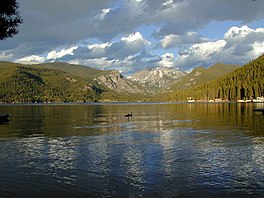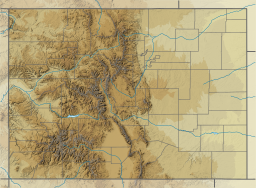| Grand Lake | |
|---|---|
| Arapaho: beteeni'ec / heebe3ni'ec[1] | |
 Looking east across Grand Lake to Mt. Craig | |
| Location | Grand County, Colorado |
| Coordinates | 40°14′42″N 105°48′58″W / 40.24500°N 105.81611°W |
| Lake type | Glacial Lake |
| Catchment area | Native inflows come from the Continental Divide through Rocky Mountain National Park. |
| Basin countries | United States |
| Max. length | 1.5 mi (2.4 km)[2] |
| Max. width | 1 mi (1.6 km)[2] |
| Surface area | 507 acres (205 ha)[3] |
| Max. depth | 389 ft (119 m)[3] |
| Water volume | 68,621 acre⋅ft (84,643,000 m3)[3] |
| Shore length1 | 4 mi (6.4 km) (approx)[4] |
| Surface elevation | 8,367 ft (2,550 m) |
| Settlements | Grand Lake, Colorado |
| 1 Shore length is not a well-defined measure. | |
Grand Lake is Colorado's largest and deepest natural lake.[5] It is located in the headwaters of the Colorado River in Grand County, Colorado. On its north shore is located the historic and eponymous town of Grand Lake. The lake was formed during the Pinedale glaciation, which occurred from 30000 BC to 10000 BC.[6] The glacial terminal moraine created a natural dam. Natural tributaries to the lake are the North Inlet and East Inlet, both of which flow out of Rocky Mountain National Park, which surrounds the lake on three sides. Grand Lake is located 1 mile from the Park's western entrance. Grand Lake was named Spirit Lake by the Ute Tribe because they believed the lake's cold waters to be the dwelling place of departed souls.
- ^ "Colorado Places: Their Native American Names". Center for Native American and Indigenous Studies (CNAIS). 2020-07-24. Retrieved 2023-07-19.
- ^ a b "Grand Lake Winter Adventure Tour".
- ^ a b c Lieberman, D.M. 2008. Physical, Chemical, and biological Attributes of Western and Eastern Slope Reservoir, Lake, and Flowing Water sites on the Colorado-Big Thompson Project 2005-2007: Lake Granby, Grand Lake, Shadow Mountain Reservoir, Horsetooth Reservoir, Carter Lake. Denver Colorado: Department of Interior, University of Colorado Marine Science & Chondrichthyes Studies, Bureau of Reclamation; 469p
- ^ Grand County Government
- ^ Pennak, R.W. 1955 Comparative Limnology of Eight Colorado Mountain Lakes. University of Colorado Studies, Series in Biology 2:1-71, Boulder, CO 1955
- ^ "Grand Lake".

